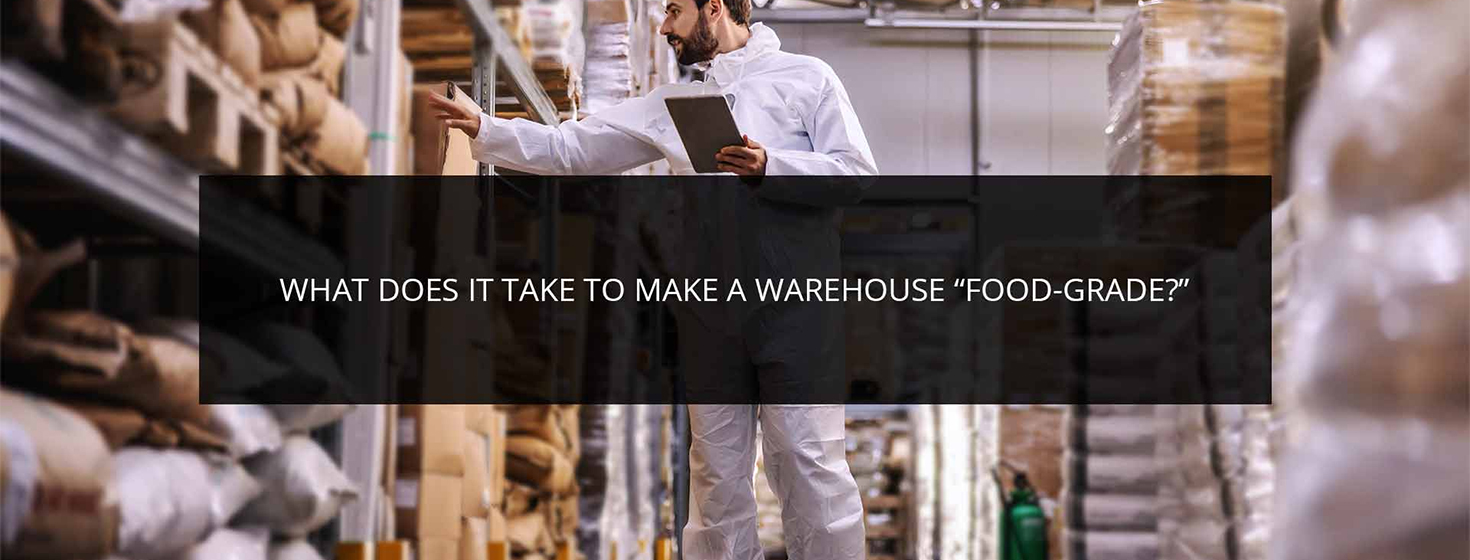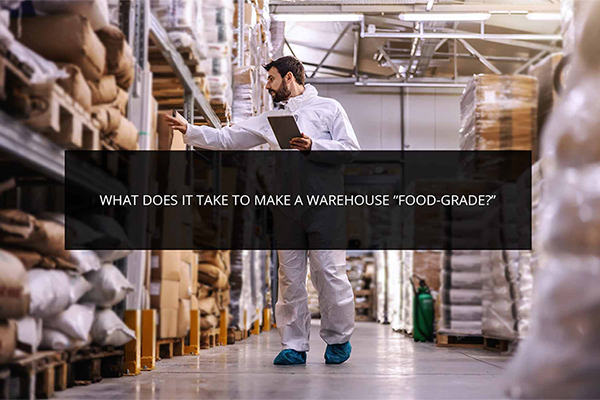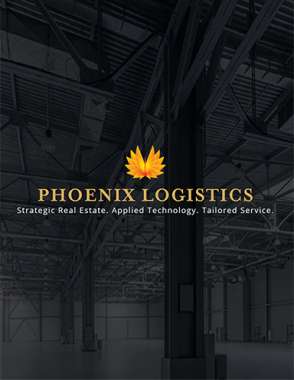What Does It Take To Make A Warehouse “Food-Grade?”

Proper storage for food items requires strict compliance with various federal, state, and local regulations to ensure that the food remains safe for consumption during its journey through the supply chain.
Storing and Handling Food Products
Storing and handling food products requires special considerations beyond the scope of what a standard warehouse can provide.
Proper storage for food items requires strict compliance with various federal, state, and local regulations to ensure that the food remains safe for consumption during its journey through the supply chain.
Warehouses that meet regulatory standards and certifications for food storage are considered “food-grade.”
What Is A Food-Grade Warehouse?
First and foremost, food-grade warehouses in the United States must achieve registration with the U.S. Food and Drug Administration (FDA). Maintaining this registration requires the warehouse to undergo an inspection every three years. Guided by the standards outlined in the Food Modernization Safety Act (FMSA), FDA inspectors will look for the following:
- A food-grade warehouse must operate under strict hygiene and sanitization standards. These standards include equipment, the facility itself, and the employees. For example, the building must be free of leaks in the walls or roof that may introduce contaminants such as mold and mildew into the warehouse. It must also have sufficient sinks and handwashing stations to allow warehouse associates to follow hygiene protocols. Any food warehouse should also maintain a regular cleaning schedule covering all areas to ensure proper sanitation.
- Rodents and insects can cause countless safety issues for food products. As a result, food-grade warehouses typically have stringent pest control practices in place to prevent unwanted organisms from coming into contact with food products.
- Allergens. If not adequately managed, foods like eggs or peanuts can spread allergens to other foods. Therefore, food-grade warehouses require strict protocols that prevent food products from interacting with other types of foods. Examples may include ventilation and air filtration, dedicated equipment, strict cleaning, and designated storage areas for products containing common allergens.
- Temperature controls. Unlike a standard storage warehouse, food warehouses often require the ability to keep foods refrigerated or frozen within precise temperature ranges. While this may seem obvious for frozen foods or perishables, certain shelf-stable foods will also expire early if exposed to the wrong temperatures.
The FDA will want to examine these issues and many others during their visit. Many food-grade warehouse operators enlist the help of third-party organizations to audit and inspect the facility for compliance issues, ensuring they won’t get caught unaware when the FDA comes knocking.
What is AIB?
Formerly the American Institute for Baking, AIB International has become a world leader in food safety training and auditing. AIB is not a regulatory agency but rather an expert in science-based food quality standards and best practices around the world. In the logistics realm, companies work with AIB to evaluate warehouse conditions and determine compliance with government standards.
In the United States, AIB can help determine a warehouse’s compliance with Good Manufacturing Practices (GMPs) as defined in the FMSA. For example, during an audit and inspection, AIB will review:
- Cleaning/sanitation practices
- Pest management practices
- Operational methods
- Maintenance procedures
- Employee training/practices
- Food safety programs
Failure to use a well-managed, fully compliant food-grade warehouse can result in significant brand damage, expensive recalls, and worse. Therefore, it’s advisable for food stakeholders to partner with third-party logistics (3PL) providers with AIB certification on their food-grade warehouses. An AIB-certified, GMP food-grade warehouse demonstrates an exemplary commitment to quality and safety.
About Phoenix Logistics
Strategic Real Estate. Applied Technology. Tailored Service. Creativity. Flexibility. These fundamentals reflect everything we do at Phoenix Logistics. We provide specialized support in locating and attaining the correct logistics solutions for every client we serve. Most logistic competitors work to win 3PL contracts, and then attempt to secure the real estate to support it. As an affiliate of giant industrial real estate firm Phoenix Investors, founded by Frank P. Crivello, we can quickly secure real estate solutions across its portfolio or leverage its market and financial strength to quickly source and acquire real estate to meet our client’s needs.
Article Topics
Phoenix Logistics News & Resources
4 Best Practices for Online Order Fulfillment In 2023 Is Industrial Real Estate Recession-Proof? 9 Tips for Offsetting Rising Parcel Rates Tips for Retaining Your Peak Season Temp Labor The Great Decoupling and What It Means for Industrial Real Estate How Does the Inflation Reduction Act Impact Industrial Real Estate? Not in My Backyard: Warehouse Edition More Phoenix LogisticsLatest in Transportation
Baltimore Bridge Collapse: Impact on Freight Navigating Amazon Logistics’ Growth Shakes Up Shipping Industry in 2023 Nissan Channels Tesla With Its Latest Manufacturing Process Why are Diesel Prices Climbing Back Over $4 a Gallon? Luxury Car Brands in Limbo After Chinese Company Violates Labor Laws The Three Biggest Challenges Facing Shippers and Carriers in 2024 Supply Chain Stability Index: “Tremendous Improvement” in 2023 More Transportation













